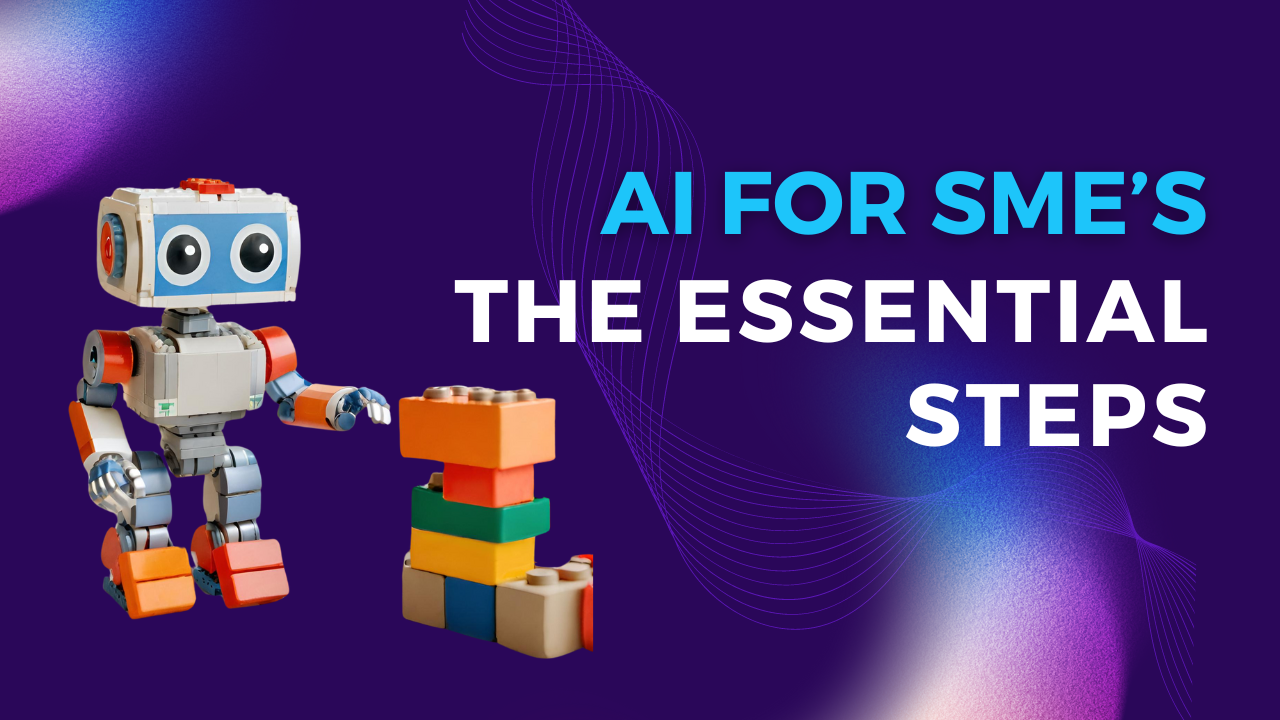Embracing AI in Traditional Industries: A Tale of Two SMEs
It’s clear that while AI continues to revolutionise every sector, SMEs find themselves at varying stages of this tech tidal wave.
On one hand, we see the pioneers—these adventurous businesses are not just dipping their toes but diving headfirst into the AI pool, experimenting with tools that could redefine their operations. On the other hand, there are the cautious, standing by the shore, intrigued by the promise of AI but held back by uncertainty and a lack of technical prowess.
Today we’re drawing from our firsthand observations working on AI adoption projects with SME’s to spotlight these two groups: the AI enthusiasts actively embracing the new tech, and the cautious onlookers who’ve heard all the buzz, but don’t know where to start their first move.
Comparison of Two Types of Businesses
Type 1 Businesses: Actively Exploring AI
Let’s call these guys the Innovate Integrators
These SMEs have taken proactive steps towards AI integration. By leveraging freely available AI tools, they have started incorporating AI assistance into their daily workflows.
These businesses benefit from organised data sources and have clear project ideas and objectives, which make exploring new AI initiatives more straightforward.
Their primary goal is to foster innovation—whether through improving processes, enhancing efficiencies, or developing new products.
Type 2 Businesses: Aware but Inexperienced with AI
Let’s call these guys the Aspiring Adopters
Contrastingly, the second type of SMEs understands the potential of AI but lacks firsthand experience. Their data is often scattered and disorganised, which poses a significant barrier to the adoption of any AI technology.
These businesses typically do not have dedicated AI teams or initiatives, relying instead on busy management teams with little to no AI exposure.
Their goals are fundamentally about enhancing operational efficiency—saving time, reducing costs, and supporting their workforce more effectively.

Challenges and Opportunities
Challenges
The Innovative Integrators have enthusiastically adopted AI tools like Chat GPT and are now facing the next set of challenges as they seek to deepen their engagement with this technology.
One major challenge is the need to deepen their AI knowledge beyond the basics.
As they integrate more complex AI systems into their operations, there is a growing demand for advanced skills and understanding that can handle these complexities effectively.
Additionally, as these businesses scale their AI initiatives, they must also manage the integration of these technologies across different departments and functions, ensuring consistency and efficiency without disrupting existing processes or compromising privacy.
The Aspiring Adopters are keen to harness the benefits of AI but face significant hurdles due to their lack of foundational elements.
Firstly, their data is often disorganised and scattered across multiple systems, making it difficult to leverage AI effectively, which relies heavily on data quality and accessibility.
Secondly, there is a noticeable gap in technical expertise within these businesses. They need to build or acquire technical capabilities to not only understand the potential uses of AI but also to implement and manage AI projects. This includes training for existing staff and possibly hiring new talent with the requisite skills.
Embracing AI in your business isn’t just about technology; it’s about setting the stage for innovation, efficiency, and growth, no matter where you start on the AI journey.
Opportunities
For the Innovative Integrators, the opportunities are vast. By advancing their knowledge and capability in AI, they can unlock more sophisticated applications, such as predictive analytics, automated decision-making, and personalised customer experiences.
These advancements can lead to significant competitive advantages, opening up possibilities for new products and services that are not only more efficient but also more aligned with customer needs.
Despite their challenges, the opportunities for the Aspiring Adopters are equally promising.
Starting from a lower base means that even small advancements in AI integration can result in significant improvements in efficiency and productivity. By organising their data and developing AI skills, they can begin to automate routine tasks, gain insights from their data, and ultimately make more informed business decisions.
Additionally, their enthusiasm for AI can be a catalyst for creating a culture of innovation and continuous improvement within their organisations.
Both groups stand to gain immensely from their AI journeys by addressing their respective challenges and leveraging the opportunities that come with more effective use of technology.
Guide for SMEs on Preparing for AI Projects
To effectively prepare for AI projects, SMEs should consider the following steps:
- Understanding AI and Its Capabilities: Begin with a solid understanding of what AI can and cannot do. This knowledge will help set realistic expectations and identify potential AI applications within the business.
- Data Organization and Management: AI systems require well-organised data to function effectively. Ensuring that data is accurately collected, properly stored, and easily accessible is crucial.
- Building Technical Expertise: Whether through hiring new talent, partnering with AI experts, or investing in employee training, enhancing your team’s AI capabilities is essential.
- Setting Clear Goals and Objectives: Clearly define what you aim to achieve with AI. This clarity will guide your AI strategies and help measure success.
- Starting Small and Scaling: Initiate your AI journey with small, manageable projects. This approach allows you to learn and adapt before expanding AI applications across the business.
- Encouraging a Culture of Innovation: Cultivate an environment that embraces change and encourages innovation. Support from all levels of the organisation is crucial for successful AI adoption.
Effective AI implementation begins with robust data organization—ensuring your data is clean, comprehensive, and accessible is the cornerstone of unlocking AI’s full potential in your business.

Exploring the integration of AI into your business operations shows us that, whether you’re actively experimenting like the “Innovative Integrators” or just beginning to explore like the “Enthusiastic Novices,” the potential advantages are significant.
AI can streamline processes, enhance decision-making, and open doors to new possibilities, regardless of your starting point.
We know that starting with AI can feel like a big step. The good news? You don’t have to tackle it alone. At AI Copilot, we’re here to support you every step of the way. We offer tailored advice and hands-on assistance to help businesses of all sizes leverage AI effectively and responsibly.
If you’re curious about what AI can do for your business and how to get started, we’re ready to assist. Reach out to us at AI Copilot. Let’s discuss your needs, explore your options, and plan your AI strategy together.
Interested in how AI can enhance your business operations?
Contact AI Copilot. Let’s work together to harness the power of AI and take your business to the next level.

